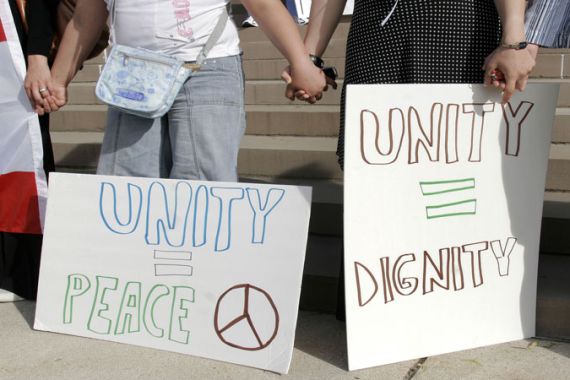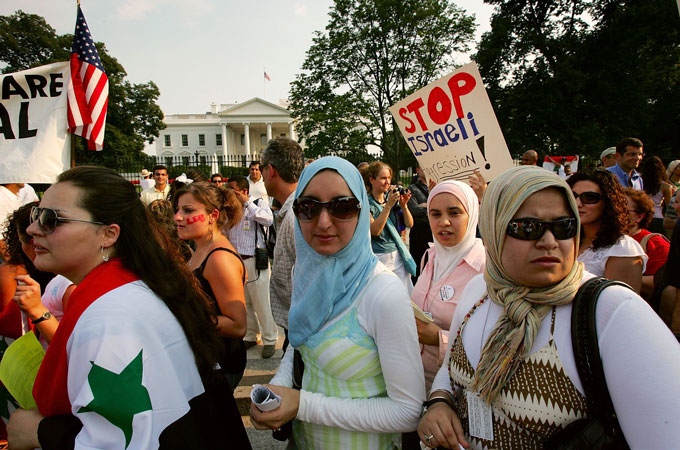The ADC vs the Arab-American community
Racism and hostility toward the Arab-American community cannot be addressed by organisations with dwindling credibility.

 |
| Arab-Americans have used organisations such as the Arab-American Anti-Discrimination Committee to defend their civil liberties in the US and bring government attention to matters overseas [GALLO/GETTY] |
Malek Jandali’s “dis-invitation” from the annual convention of the Arab-American Anti-Discrimination Committee (ADC) earlier this month raises questions about the organisation’s ability to accurately claim that it represents the Arab-American community. It also highlights the dire need for the ADC to re-examine its longstanding ties to authoritarian Arab regimes, US law enforcement, and the Washington political elite.
Jandali is a renowned Syrian musician who had been set to perform his song, Watani Ana, [“I am my homeland”], at the group’s annual convention. In the days leading up to the performance, ADC Chair Safa Rifka wrote Mr Jandali an email, warning him: “I just want to make sure that your stand on the issue of Syria will not be carried over to the convention.”
Jandali rejected the condition, and Rifka personally ordered ADC staff to disinvite him.
Incensed by the incident, more than 700 Arab-Americans and allies signed a petition calling on Rifka to resign, citing his willingness to defend the Syrian regime – even as the death toll in that country rises above 1,300. The petition also called for the resignation of Ray Hanania, a Palestinian American ADC board member appointed by Rifka, who is notorious for his vile and obnoxious attacks on Palestine solidarity activists.
To date, the ADC has refused to take action and has offensively characterised the petition’s authors and supporters as people who wish to undermine the organisation’s work. To the contrary, we care deeply about Arab-American issues. We are concerned that the organisation has opted to dig in its heels, refusing to take the steps outlined in the petition – and instead possibly saving face by allowing Hanania’s term to expire quietly, while leaving the issue of the organisation’s dependency on Rifka’s donations and leadership unaddressed.
Angering Arab-Americans
The ADC, however, can’t dodge its critics by hoping that the storm will pass. If the uprisings in the Arab world are a lesson, once out in the open, dissent has a tendency to gain traction. The problem today, really, is not the singular egregiousness of the Syrian regime, but rather, the ADC’s longstanding financial and political ties to many Arab regimes that do not tolerate human rights, let alone feminist, labour, or dissident organisations in the countries they govern. Such relationships have often disillusioned people who believe it is inconsistent to stand up for the rights of Arabs in the United States while simultaneously taking money from Arab governments and apologetically ignoring their violation of those rights.
To make matters worse, the ADC has also angered Arab-Americans because of its decision to cozy up with officials in the Bush administration – even as that government launched a full-fledged assault on our communities at home and our relatives abroad. In some cases, this discontent has led to the secession of local chapters that became independent regional groups; and in others, potential members were deterred from joining.
It is becoming increasingly the case that the ADC cannot claim to legitimately represent the Arab-American community. As an organisation, it can take a number of steps to remedy this problem.
First, it should immediately suspend all ties to Arab regimes and develop a plan to seek alternative sources of funding. If it wants to connect to Arab countries, it should connect to them through independent rights groups that are fighting for social justice, not illegitimate governments.
Second, it should commit to greater financial transparency. Many suspect that the organisation is dependent on the largess of a handful of individuals as well as foreign regimes, making it less accountable to the Arab-American community as a whole. We believe that the “need” for such a dependency is over-stated. The ADC should agree to an independent third-party audit and should publish details about its finances on its website.
Third, the ADC should adopt more democratic governance procedures. The election process for its directors is unclear because the by-laws are not accessible on the webpage and are otherwise difficult to procure. Few members know, for example, that they have the legal right to initiate disciplinary proceedings against the organisation’s directors. The organisation should disclose its corporate governance documents so that the community can be more informed about how the organisation works and how they can effect change within it.
Unfair policing and harassment
Finally, and most importantly, the ADC should review its relationship with government agencies that have targeted and caused great harm to members of our community. ADC’s job is to defend the rights of our community against government incursion, rather than cast itself as the government’s ally in the pursuit of misguided policies. The infiltration of mosques, civic organisations, and community centres with informants and spies by federal law enforcement creates a climate of fear and divisiveness. In many cases, these federal agencies concoct terror plots and entrap otherwise innocent individuals in the process. The ADC’s collaboration with such agencies only further promotes unfair policing and harassment of Arab-Americans while undermining our civil rights. The ADC should not give organisations like the FBI the benefit of association with the Arab-American community while such policies continue.
Overall, the ADC has failed to demonstrate that it knows how to design and execute effective political campaigns on behalf of our community in Washington. Despite the positive work by many ADC staff on a local and national level, including the publication of reports and the pursuit of impact litigation, the ADC has a poor record of political advocacy. It should know that its power in Washington can only rest on a healthy, thriving, and organised grassroots to bolster its work. While strong local organisations are the most important aspect of political advocacy, it is undeniable that some issues can be effectively addressed only on a national scale. Yet the ADC has not shown that it knows how to coordinate strong national campaigns, or even that it is capable of impacting the national political agenda and conversation in any way. The fact that, despite a considerable lack of resources, campus organisations have been better at impacting public discourse than the ADC over the past decade highlights the issue.
A much larger problem
Many of the problems above arise out of the fact that the ADC’s presence in Washington appears to be geared at schmoozing with the Washington political elite, not at developing strategic contacts and allies in government agencies that can later be utilised to pursue an affirmative agenda. For example, the ADC should be utilising its resources to pressure the Department of Justice to stop the grand jury investigation of 23 Arab-American and solidarity activists in the Midwest that threatens our First Amendment rights.
It should be reaching out to and filing Title VI complaints with the Office of Civil Rights at the Department of Education on behalf of student activists who have been harassed, silenced, and otherwise marginalised on campus due in part to their background and their Palestine solidarity and anti-war organising. It should be confronting the State Department about its failure to protect Americans who are planning a flotilla headed towards Gaza.
A group headquartered in Washington is better positioned to navigate such institutions than regional groups, though their support is essential. Surely such work would be more effective political advocacy that actually benefits the Arab-American community than political donations or the bestowal of useless honours and awards to officials at expensive galas.
It should be clear that the Malek Jandali episode was one symptom of a much larger problem that requires a change of direction at the ADC. We repeat our call to the Arab-American community to continue pressuring the ADC to better represent its interests; to date, the organisation has been dismissive of such calls. So long as the ADC continues to claim to speak on behalf of the Arab American community at large, despite the growing divide between the two, we call on community members and allies alike to recognise the difference. Racism and violent hostility toward the Arab-American community cannot be alleviated by organisations with dwindling credibility, moral and political. Now more than ever, Arab-Americans must reclaim the institutions that ought to safeguard our human and civil rights and liberties, and steer them in a direction that truly upholds our principles.
Hoda Mitwally is an Egyptian-American and a recent graduate of Rutgers University, where she was involved with Middle East solidarity organising.
Yaman Salahi is a third-year Syrian-American student at Yale Law School and a member of Students for Justice in Palestine.
For more details about the effort to reform the ADC, visit: http://reformadc.wordpress.com
The views expressed in this article are the author’s own and do not necessarily reflect Al Jazeera’s editorial policy.
